
Chives, scientific name Allium schoenoprasum, is a species of flowering plant in the family Amaryllidaceae that produces edible leaves and flowers.
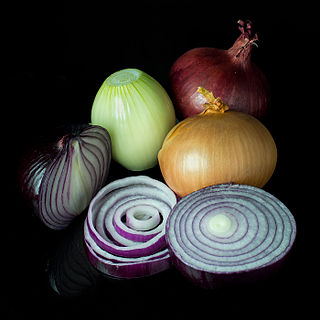
An onion, also known as the bulb onion or common onion, is a vegetable that is the most widely cultivated species of the genus Allium. The shallot is a botanical variety of the onion which was classified as a separate species until 2011. Its close relatives include garlic, scallion, leek, and chive.

Allium tuberosum is a species of plant native to the Chinese province of Shanxi, and cultivated and naturalized elsewhere in Asia and around the world. It has a number of uses in Asian cuisine.

Allium tricoccum is a bulbous perennial flowering plant in the amaryllis family Amaryllidaceae. It is a North American species of wild onion or garlic found in eastern North America. Many of the common English names for this plant are also used for other Allium species, particularly the similar Allium ursinum, which is native to Eurasia. An edible plant, Allium tricoccum is used in a variety of North American and indigenous cuisines, and has also been used by Native Americans in traditional medicine. A French rendering (chicagou) of a Native American name for this plant is the namesake of the American city of Chicago.

Allium vineale is a perennial, bulb-forming species of wild onion, native to Europe, northwestern Africa and the Middle East. The species was introduced in Australia and North America, where it has become an Invasive species.

Allium canadense, the Canada onion, Canadian garlic, wild garlic, meadow garlic and wild onion is a perennial plant native to eastern North America from Texas to Florida to New Brunswick to Montana. The species is also cultivated in other regions as an ornamental and as a garden culinary herb. The plant is also reportedly naturalized in Cuba.
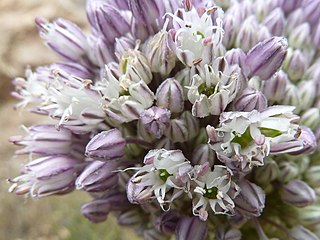
Allium ampeloprasum is a member of the onion genus Allium. The wild plant is commonly known as wild leek or broadleaf wild leek. Its native range is southern Europe to southwestern Asia and North Africa, but it is cultivated in many other places and has become naturalized in many countries.

Allium sphaerocephalon is a plant species in the Amaryllis family known as round-headed leek, round-headed garlic, ball-head onion, and other variations on these names. Drumstick allium is another common name applied to this species. Some publications use the alternate spelling Allium sphaerocephalum. It is a bulbous herbaceous perennial plant.
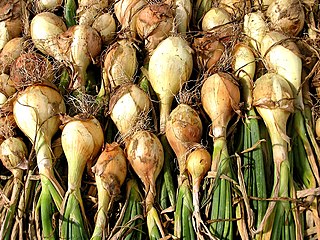
White onion or Allium cepa are a cultivar of dry onion which have a distinct light and mild flavour profile. Much like red onions, they have a high sugar and low sulphur content, and thus have a relatively short shelf life. White onions are used in a variety of dishes, such as those of Mexican and European origin. Their uses in dishes often relate to their mild nature, they are often included in dishes to provide a light, fresh and sour taste to dishes and are often added uncooked to dishes such as salads.

Allium nigrum, common name black garlic, broad-leaved leek, or broadleaf garlic, is a Middle Eastern species of wild onion. It lacks the onion or garlic scent shared by most of the other species in the group. The species is native to Turkey, Cyprus, Syria, Lebanon, and Israel but cultivated as an ornamental in many other places. It has become naturalized in some regions, including parts of the United States.

Allium cernuum, known as nodding onion or lady's leek, is a perennial plant in the genus Allium. It grows in open areas in North America.

Allium moly, also known as yellow garlic, golden garlic and lily leek, Is a species of flowering plant in the genus Allium, which also includes the flowering and culinary onions and garlic. A bulbous herbaceous perennial from the Mediterranean, it is edible and also used as a medicinal and ornamental plant.

Allium cristophii, the Persian onion or star of Persia, is a species of flowering plant in the family Amaryllidaceae, native to Iran, Turkey, and Turkmenistan, though grown as an ornamental bulbous plant in many parts of the world. It may be sold under the synonym of Allium albopilosum.

Allium unifolium, the one-leaf onion or American garlic, is a North American species of wild onion. It is native to the coastal mountain ranges of California, Oregon, and Baja California. It grows on clay soils including serpentine, at elevations up to 1100 m.

Allium textile is a common species of wild onion found in the central part of North America.

Allium flavum, the small yellow onion or yellow-flowered garlic, is a species of flowering plant in the genus Allium. A bulbous herbaceous perennial, it is native to the lands surrounding the Mediterranean, Black, and Caspian Seas, from areas like France and Morocco to Iran and Kazakhstan.
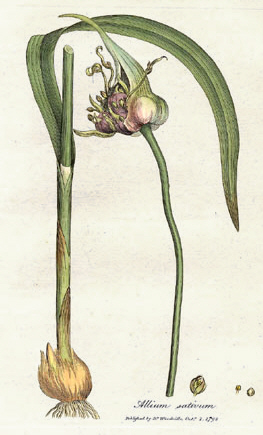
Allium is a genus of monocotyledonous flowering plants with hundreds of species, including the cultivated onion, garlic, scallion, shallot, leek, and chives. It is one of about 57 genera of flowering plants with more than 500 species. It is by far the largest genus in the Amaryllidaceae, and also in the Alliaceae in classification systems in which that family is recognized as separate.

A leek is a vegetable, a cultivar of Allium ampeloprasum, the broadleaf wild leek. The edible part of the plant is a bundle of leaf sheaths that is sometimes erroneously called a stem or stalk. The genus Allium also contains the onion, garlic, shallot, scallion, chives, and Chinese onion. Three closely related vegetables, elephant garlic, kurrat and Persian leek or tareh, are also cultivars of A. ampeloprasum, although different in their culinary uses.
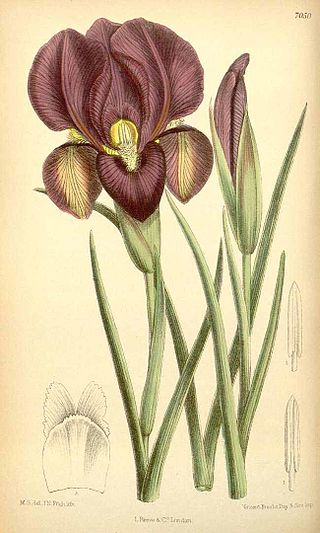
Iris barnumiae is a species in the genus Iris; it is also in the subgenus Iris and in the section Oncocyclus. It is a rhizomatous perennial, from Armenia, Azerbaijan, Iran, Iraq, and Turkey. It has pale glaucous green and narrow leaves, that are slightly sickle-shaped and fade soon after blooming. It has, in mid- to late spring, fragrant flowers in shades of purple, from red-purple, mulberry to purplish-violet, with a yellow tipped with purple beard. It was renamed as I. barnumiae in after a plant naming conference in 2011, but is still sometimes named as I. barnumae in some sources. It has one accepted subspecies Iris barnumiae subsp. demawendica and two forms; Iris barnumiae f. protonyma (Stapf) B.Mathew & Wendelbo and Iris barnumiae f. urmiensis (Hoog) B.Mathew & Wendelbo, which has yellow flowers. Sometimes I. barnumiae f. barnumiae is used to describe the basic form. It is rarely cultivated as an ornamental plant in temperate regions, due to its needing very dry and warm summer conditions.

Allium guttatum, spotted garlic, is a species of wild garlic native to Morocco, Algeria, Tunisia, Libya, Portugal, Spain, France, Italy, Sardinia, Sicily, the Balkan Peninsula, the Aegean Islands, Turkey, Cyprus, Romania, and Ukraine. Described in 1809, by 1819 it was being cultivated in British gardens as an ornamental.



















